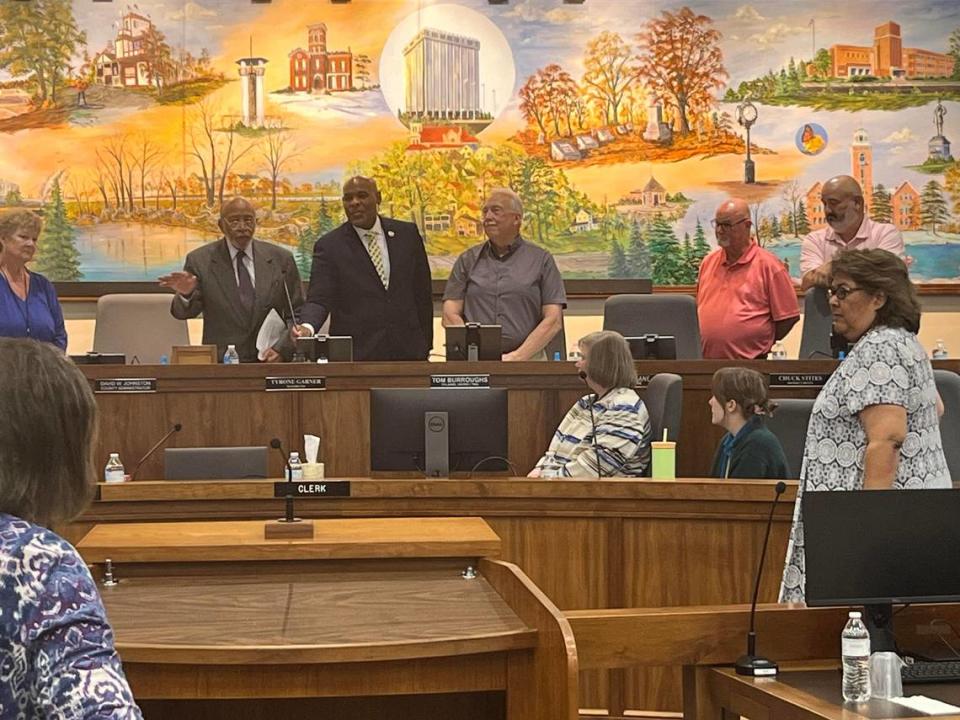‘A great man’: KCK bids fond farewell to civil rights activist, historian Chester Owens
After 78 years in Kansas City, Kansas, locally renowned civil rights activist and historian Chester C. Owens Jr. is moving away.
Before he does, though, the Unified Government of Wyandotte County and KCK is celebrating him with an honorary sign to mark a one-block stretch of 12th Street in Strugglers Hill where he and his wife, who died in 2017, spent much of their lives.
On Thursday, commissioners voted to approve the sign. Mayor Tyrone Garner also handed Owens a key to the city.
Speaking from the mayor’s chair to a crowd of associates, well-wishers, family and friends, Owens recalled his own long history working to help better the lives of his neighbors in KCK and Wyandotte County. He spoke of the special place Northeast KCK has in his heart, describing a once-thriving predominantly Black community beset by segregation and redlining.
He gave two main reasons for departure:
A February stroke affected his speech, eyesight, hearing and mobility, inspiring the 91-year-old to live nearer his family in North Carolina. He also says he simply cannot financially afford to live in KCK any longer.
“I have tried over the years (to) do my part to make Kansas City, Kansas, and Wyandotte County a better place to live. I believe that the vast majority of people have more in common than not,” he said, before quoting Martin Luther King Jr. as saying: “We all can live together as brothers and sisters. Or we can die together as fools.”

Owens’ long list of accomplishments in the city include his influence in bringing King to visit KCK. Owens and his wife Lillie co-opened with another couple a bookstore on 5th and Quindaro called The Hub, known to carry Black literature, in April 1963.
In his professional life, Owens worked in insurance with H.W. Sewing and Co., eventually becoming the company’s president. He was also the first Black man elected to represent Kansas City, Kansas, as a government official in 1983, and served two terms.
Over the course of an hour Thursday night at City Hall, several community leaders, elected officials, activists and residents spoke fondly of Owens, recalling the many ways he touched their lives and others around them.
State Sen. David Haley, a Democrat in the 4th District, said the community owes Owens a “tremendous debt of gratitude and remembrance.”
“I’ve always looked up to him. I’ve always looked at the way he forged ideals. He is our modern griot today.”
Phil Dixon, a Wyandotte County native and co-founder of the Negro Leagues Baseball Museum, noted Owens helped obtain insurance coverage for the museum in its infancy.
“We started off in a one room building in the Lincoln Building. And the main building had insurance because one person went out and fought when they had redlined all the communities in the city … People don’t talk about that. But he was actually the one who broke down the barrier, and we were able to get things insured,” Dixon said.
“This is a great man. And he helped me a lot with history. And so I hope to continue to build on his legacy because he left a firm foundation for this community.”
Also joining from North Carolina by conference call was Karen Owens, his daughter, who said her parents always instilled in the family the need “to think globally but act locally. “
“In a world steeped in chaos and war, hidden and political agendas, crime and oppression, hate, inequity, unprecedented injustice … It’s our hope that the city of Kansas City, Kansas, and its leaders on behalf of the residents of Wyandotte County, will continue to use the example of our parents, Chester and Lillie Owens, as a blueprint for how to conduct business in a proactive way, in the service of all humanity.”
Owens plans to move in August or September. Growing emotional Thursday evening, he said it is hard to leave “the city that has been so good to me” — and a place he believes still holds great promise.
“But I am not gone yet. I may have some unfinished business making Kansas City, Kansas, the city that has the potential to become one of the best cities in America.”

